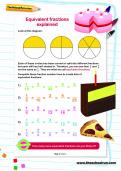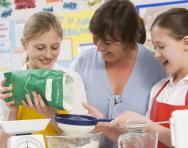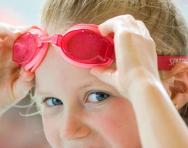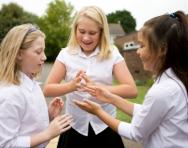7 life skills all primary-school children need

Life skill: cooking
Why it matters: Cooking is a skill that your child will use for the rest of her life, and has many other benefits, too. ‘It helps her to understand food, nutrition and the benefits of a healthy diet,’ says Romilla Arber, chief executive of the Food Education Trust. ‘It also opens up social avenues and teaches independence and kitchen safety.’
How and when to learn: ‘Children can start helping you to mix cakes as soon as they’re old enough to stand on a chair,’ says Romilla. ‘And as long as they’re supervised, they can be using sharp knives by Year 1, and stirring a pan on the stove by the age of nine.’


Boost your child's maths & English skills!
- Follow a weekly programme
- Maths & English resources
- Keeps your child's learning on track
Good dishes to cook with your child include cakes, bread and soup: for inspiration, check out kids' recipe collections online or Romilla’s book, What’s for Dinner? Second Helpings (£25, Park Family Publishing Ltd). Prefer to leave it to the professionals? Kiddy Cook runs courses for four- to 11-year-olds across the UK.
Life skill: typing
Why it matters: Learning to touch-type could give your child a massive boost, both in their education and in the workplace. ‘A “fast pecker” at the keyboard is, at best, half the speed of a touch-typist,’ says Sue Westwood of English Type. ‘If your child can touch-type, it could give them a 200 to 300 per cent advantage over other children.’
How and when to learn: Sue recommends that children should start learning touch-typing in Year 2 or 3. ‘It’s much faster to learn when you’re young, and children typically achieve 30 words per minute and 90 per cent accuracy after 25 hours’ practice,’ she says. Less than 15 per cent of schools teach touch-typing, so try an online typing course for children such as English Type.
Life skill: first-aid
Why it matters: First-aid isn’t just about saving lives; it’s also about recognising dangers, helping people who are injured or unwell, and knowing how to get help in an emergency – important skills for children and adults alike. ‘Children often embrace these skills, and are proud to think they may be able to use them in the future,’ says Paula Farrell, director of Aid Training.
How and when to learn: What sort of skills your child can learn, and at what age, depends on the child's temperament. ‘Some eight-year-olds are quite happy to learn CPR, while others are more sensitive about the reasons why it might be needed, but as a starting point, most children can learn about the primary survey, calling for help, the recovery position, dealing with minor burns and bleeds, fainting and choking,’ says Paula.
There are a number of good first-aid courses for children, run by organisations such as Aid Training and St John Ambulance. The British Red Cross has also produced free first aid apps.
Life skill: money skills
Why it matters: Research shows that children start to be aware of money from three years old. ‘By the age of seven, most children have already formed basic money habits like understanding the value of money and the concepts of earning and saving, although they’re only just beginning to grasp the difference between necessity and luxury,’ says Kirsty Bowman-Vaughan of the Money and Pensions Service.
How and when to learn: Although your child will learn some money skills at school, most of her financial education will come from you. ‘Your child could help you compile a shopping list, which shows her how to prioritise what is needed and avoid overspending,’ Kirsty explains. ‘In the shop, she can become aware of comparing prices, choosing items which are the best value and deciding how much money to spend.’ Older children can get involved in making budgets, for example, for your Christmas shopping – factoring in wrapping paper, sticky tape and petrol money as well as presents. ‘Giving pocket money can also help, but the key is to give it regularly, otherwise it’s hard for children to learn to budget,’ says Kirsty.
Life skill: swimming
Why it matters: As well as being good exercise, swimming is a key safety skill for children, yet research by the Amateur Swimming Association shows that only 51 per cent of children can swim 25m – the National Curriculum required standard – on leaving primary school.
How and when to learn: All schools must provide swimming lessons at some point during Key Stage 2. ‘School swimming is the single most effective way of teaching children how to be safe in and around water,’ says David Sparkes, chief executive of the ASA. However, you can build on what is learned in school lessons through additional swimming classes or by swimming regularly as a family. Find your nearest pools, swimming clubs and ASA accredited swimming courses online.
Life skill: lifesaving
Why it matters: Drowning is the third biggest cause of accidental death among children in the UK. ‘If everyone learned drowning prevention skills early in life, many lives could be saved,’ says Mike Dunn, lifesaving programme manager at the Royal Lifesaving Society (RLSS). ‘Learning lifesaving also develops a range of other skills, including communication, water confidence and teamwork.’
How and when to learn: Water safety is a mandatory part of school swimming lessons, but the RLSS’ Rookie Lifeguard courses – ideal for children aged eight to 12, who can swim 25m – will teach her additional skills. ‘We focus on survival and self-rescue skills, including floating, treading water and climbing out, alongside basic lifesaving skills that could help her to help other people,’ says Mike. Visit the RLSS to find a course near you.
Life skill: DIY
Why it matters: Over half of all UK adults admit to a poor grasp of DIY skills. ‘It’s key that our younger generation start learning the skills that many of the older generation lack, and if a child gets enthusiastic about DIY, they'relikely to want to continue the hobby in later life,’ says Julian Langton, help and advice manager at B&Q.
How and when to learn: If you’re handy with a screwdriver, The All-New Woodworking for Kids (£8.99, Lark) will help you work with your child on introductory projects, such as a DVD storage cube. DIY novice? Some DIY stores also run holiday workshops for kids and parents.

Give your child a headstart
- FREE articles & expert information
- FREE resources & activities
- FREE homework help








